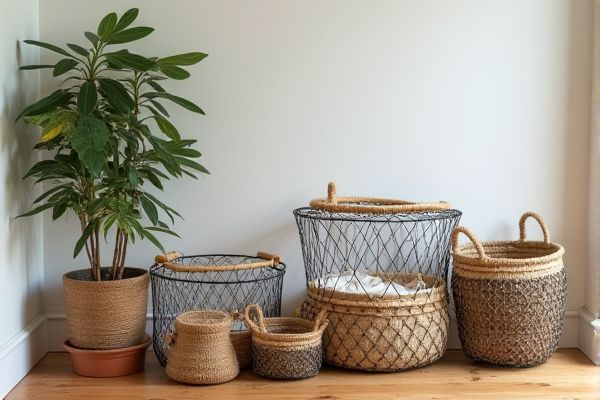
Mesh baskets offer a fine grid that prevents smaller items from slipping through, making them ideal for organizing delicate or tiny objects, while wire baskets feature an open design that provides better airflow and visibility, perfect for storing larger or bulkier items. Understanding the differences can help you choose the right storage solution for your needs--explore the article to find out which basket suits Your space best.
Table of Comparison
| Feature | Mesh Baskets | Wire Baskets |
|---|---|---|
| Material | Fine metal or plastic mesh | Thick metal wire |
| Ventilation | Excellent airflow, dust-resistant | Good airflow, less dust protection |
| Durability | Strong but can deform under heavy load | Highly durable, supports heavier loads |
| Visibility | Partial visibility of contents | High visibility of contents |
| Weight | Lightweight | Heavier than mesh baskets |
| Common Uses | Office organization, storage of small items | Industrial storage, heavy-duty applications |
| Cleaning | Easy to clean, less debris trapping | May trap debris, requires more maintenance |
| Cost | Generally lower cost | Typically higher cost |
Introduction to Mesh Baskets vs Wire Baskets
Mesh baskets feature a network of woven metal wires providing excellent airflow and visibility, while wire baskets consist of rigid, thicker wires arranged in a grid pattern for enhanced durability and load-bearing capacity. Your choice depends on whether you prioritize lightweight breathability or robust support for heavier items. Both basket types serve distinct storage needs in homes and industries, optimizing organization and accessibility.
Material Composition and Design
Mesh baskets are typically made from interwoven metal or synthetic fibers, providing a flexible yet sturdy structure that allows for better airflow and visibility of contents. Wire baskets are composed of thicker, solid metal rods arranged in a fixed grid, offering enhanced durability and support for heavier items. Your choice between mesh and wire baskets depends on whether you prioritize ventilation and lightweight design or maximum strength and load-bearing capacity.
Durability and Strength Comparison
Mesh baskets offer enhanced durability due to their tightly woven metal construction, which resists deformation and provides consistent load distribution. Wire baskets, while typically lighter and more open in design, may be more prone to bending under heavy loads or impact, affecting their long-term strength. Choosing mesh baskets can improve your storage system's reliability by ensuring stronger resistance to wear and tear in demanding environments.
Ventilation and Airflow Efficiency
Mesh baskets offer superior ventilation and airflow efficiency compared to wire baskets due to their tightly woven structure, which allows for consistent air circulation and prevents moisture buildup. Wire baskets, with their wider gaps, may provide airflow but often create uneven ventilation that can lead to stagnant air pockets. Optimizing your storage or drying process with mesh baskets ensures better airflow, reducing the risk of mold or odors in stored items.
Weight and Portability Differences
Mesh baskets are generally lighter than wire baskets due to their thin, flexible material, enhancing portability for everyday carry and storage. Wire baskets, often made from thicker metal rods, provide sturdiness but add significant weight that can make transportation cumbersome. Your choice depends on balancing the need for lightweight convenience with the durability required for heavier items.
Maintenance and Cleaning Requirements
Mesh baskets offer finer openings that trap smaller debris, requiring more frequent cleaning to prevent buildup and maintain airflow. Wire baskets have larger gaps, allowing dirt and debris to fall through easily, reducing the frequency of maintenance and simplifying cleaning processes. Your choice depends on balancing cleaning convenience with the level of containment needed for your items.
Cost and Value Analysis
Mesh baskets typically offer a lower cost option due to their lightweight design and efficient manufacturing process, making them ideal for budget-conscious buyers. Wire baskets, while often more expensive, provide greater durability and structural integrity, delivering long-term value through enhanced strength and resistance to deformation. Your choice depends on balancing initial investment against the expected lifespan and application intensity, ensuring optimal cost-effectiveness for your specific needs.
Common Applications and Uses
Mesh baskets excel in applications requiring drainage and ventilation, making them ideal for food processing, industrial cleaning, and gardening. Wire baskets are preferred for heavy-duty storage, transportation, and organization of tools, hardware, and automotive parts due to their robust structure. Both types serve essential roles in manufacturing, retail, and warehouse settings, with mesh baskets facilitating airflow and wire baskets offering strength and durability.
Aesthetic and Style Considerations
Mesh baskets offer a modern and sleek appearance with their fine grid patterns, providing a subtle texture that blends seamlessly into contemporary decor. Wire baskets showcase a more industrial or rustic charm, featuring thicker wires and open designs that highlight their structural elements and create a bold visual statement. Choosing between mesh and wire baskets often depends on whether the goal is a minimalist, unobtrusive look or a standout, rugged aesthetic.
Choosing the Right Basket for Your Needs
Mesh baskets offer superior ventilation and visibility, making them ideal for storing items that require airflow, such as fruits, vegetables, or laundry. Wire baskets provide sturdy support and durability, perfect for heavier items or tools that need robust containment. When choosing the right basket for your needs, consider the item's weight, storage environment, and whether you require breathability or structural strength.
 homyna.com
homyna.com